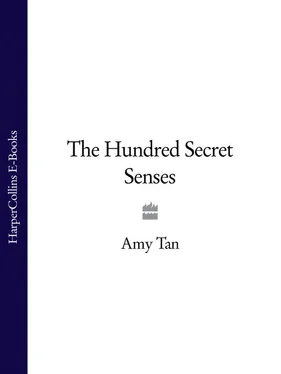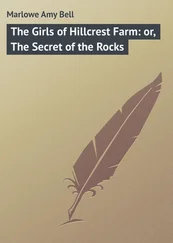‘What do you mean, she knew?’
‘She just knew – like the way hawks know to hover on a stream of air, the way rabbits freeze with fear. It’s knowledge that can’t be taught. She said her mother’s memories passed from heart to womb, and they’re now indelibly printed on the walls of her brain.’
‘Come on!’ I said dismissively. ‘She sounds like my sister Kwan.’
‘How so?’
‘Oh, she just makes up any old theory to suit whatever she believes. Anyway, biological instinct and emotional memories aren’t the same thing. Maybe Elza read or heard about Auschwitz before and didn’t remember. You know how people see old photos or movies and later think they were personal memories. Or they have a déjà vu experience – and it’s just a bad synapse feeding immediate sensory perception into longterm memory. I mean, does she even look Polish or Jewish?’ And right after I said that I had a dangerous thought. ‘You have a picture of her?’ I asked as casually as possible.
While Simon dug out his wallet, I could feel my heart revving like a race car, about to confront my competition. I feared she would look devastatingly beautiful – a cross between Ingrid Bergman illuminated by airport runway lights and Lauren Bacall sulking in a smoke-filled bar.
The photo showed an outdoorsy girl, backlit by a dusk-hour glow, frizzy hair haloing a sullen face. Her nose was long, her chin childishly small, her lower lip curled out in mid-utterance, so that she looked like a bulldog. She was standing next to a camping tent, arms akimbo, hands perched on chunky hips. Her cutoff jeans were too tight, sharply creased at the crotch. There was also her ridiculous T-shirt, with its ‘Question Authority’ in lumpy letters stretched over the mounds of her fatty breasts.
I thought to myself, Why, she isn’t gorgeous. She isn’t even button-nose cute. She’s as plain as a Polish dog without mustard. I was trying to restrain a smile, but I could have danced the polka I was so happy. I knew that comparing myself with her that way was superficial and irrelevant. But I couldn’t help feeling happily superior, believing I was prettier, taller, slimmer, more stylish. You didn’t have to like Chopin or Paderewski to recognize that Elza was descended from Slavic peasant stock. The more I looked, the more I rejoiced. To finally see the demons of my insecurity, and they were no more threatening than her cherub-faced kneecaps.
What the hell did Simon see in her? I tried to be objective, look at her from a male point of view. She was athletic, there was that. And she certainly gave the impression of being smart, but in an intimidating, obnoxious way. Her breasts were far bigger than mine; they might be in her favor – if Simon was stupid enough to like fleshy globules that would someday sag to her navel. You might say that her eyes were interesting, slanted and catlike. Although on second glance, they were disturbing, smudged with dark hollows. She stared straight into the camera and her look was both penetrating and vacant. Her expression suggested that she knew the secrets of the past and future and they were all sad.
I concluded Simon had confused loyalty with love. After all, he had known Elza since childhood. In a way, you had to admire him for that. I handed the picture back to him, trying not to appear smug. ‘She seems awfully serious. Is that something you inherit being a Polish Jew?’
Simon studied the photo. ‘She can be funny when she wants. She can do impersonations of anyone – gestures, speech patterns, foreign accents. She’s hilarious. She can be. Sometimes. But.’ He paused, struggling. ‘But you’re right. She broods a lot about how things can be better, why they should be, until she goes into a funk. She’s always been that way, moody, serious, I guess you might even say depressed. I don’t know where that comes from. Sometimes she can be so, you know, unreasonable,’ and he trailed off, seemingly troubled, as if he were now viewing her from a new light and her features were glaringly unattractive.
I hoarded these observational tidbits as weapons to use in the future. Unlike Elza, I would become a true optimist. I would take action. In contrast to her lugubriousness, I would be buoyant. Instead of being a critical mirror, I would admire Simon’s insights. I too would take active political stands. But I’d laugh often and show Simon that life with a spiritual soul mate didn’t have to be all doom and gloom. I was determined to do whatever was necessary to unseat her from Simon’s heart.
After seeing Elza’s picture, I thought she would be easy to displace. Foolish me, I didn’t know I would have to pry Simon from the clutches of a ghost. But that day, I was so happy I even accepted an invitation from Kwan to come to dinner. I brought my laundry, and just to be pleasant, I pretended to listen to her advice.
Libby-ah, let me do this. You don’t know how to use my washing machine. Not too much soap, not too much hot, always turn the pockets inside out …
Libby-ah, ai-ya, why do you have so many black clothes? You should wear pretty colors! Little flowers, polka dots, purple is a good color for you. White, I don’t like. Not because of superstition. Some people think that white means death. No such thing. In the World of Yin, there are many, many colors you don’t even know because you can’t see them with your eyes. You have to use your secret senses, imagine them when you are full of genuine feelings and memories, both happy and sad. Happy and sad sometimes come from the same thing, did you know this?
Anyway, white I don’t like because it’s too easy to get dirty, too hard to clean. It’s not practical. I know, because in my last lifetime, I had to wash lots of white laundry – lots, lots, lots. That was one of the ways I earned my room in the Ghost Merchant’s House.
On the First Day of each week I had to wash. On the Second Day, I ironed what I had washed. The Third Day was for polishing shoes and mending clothes. The Fourth Day was for sweeping the courtyard and passageways, the Fifth Day for mopping the floors and wiping the furniture in God’s House. The Sixth Day was for important business.
I liked the Sixth Day the most. Together Miss Banner and I walked around the village, handing out pamphlets called ‘The Good News.’ Even though the paper contained English words turned into Chinese, I couldn’t read them. Since I couldn’t read, I couldn’t teach Miss Banner to read. And in the poor parts of the village that we walked through, nobody knew how to read either. But people were glad to take those pamphlets. They used them to stuff inside their winter clothes. They put them over rice bowls to keep out flies. They pasted them over cracks in walls. Every few months, a boat from Canton came and brought more boxes of these pamphlets. So every week, on the Sixth Day, we had plenty to hand out. We didn’t know that what we really were giving those people was plenty of future trouble.
When we returned to the Ghost Merchant’s House, happy and empty-handed, Lao Lu would put on a little show for us. He would climb up a column, then walk quickly along the edge of the roof, while we gasped and cried, ‘Don’t fall!’ Then he would turn around and pick up a brick and place this on his head, then a teacup on top of that, then a bowl, a plate, all sorts of things of different sizes and weights. Again he would walk along that skinny edge, while we screamed and laughed. I think he was always trying to recover face from that time he fell into the water with Miss Banner and her trunk.
The Seventh Day, of course, was for going to God’s House, then resting in the afternoon, talking in the courtyard, watching the sunset, the stars, or a lightning storm. Sometimes I plucked leaves from a bush that grew in the courtyard. Lao Lu always corrected me: ‘That’s not a bush. It’s a holy tree. See here.’ He would stand with his arms straight out, like a ghost walking in the night, claiming that the spirit of nature now flowed from the tree’s limbs into his. ‘You eat the leaves,’ he said, ‘and you find peace, balance in yourself, piss on everyone else.’ So every Sunday, I used those leaves to make a tea, like a thank-you gift to Lao Lu for his show. Miss Banner always drank some too. Each week, I would say, ‘Hey, Lao Lu, you are right, the tea from this bush makes a person feel peaceful.’ Then he would say, ‘That’s not just any dogpissing bush, it’s a holy tree.’ So you see, those leaves did nothing to cure him of cursing, too bad.
Читать дальше












